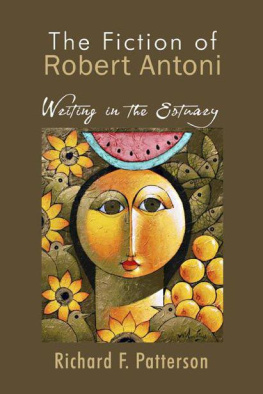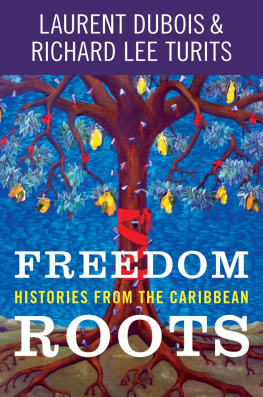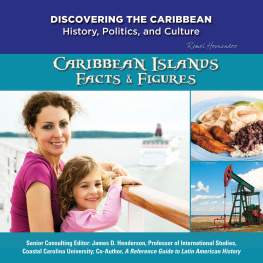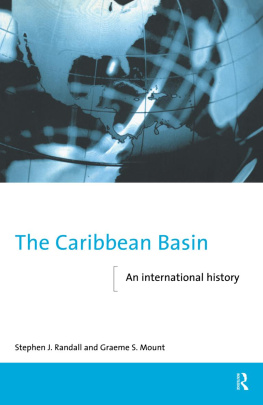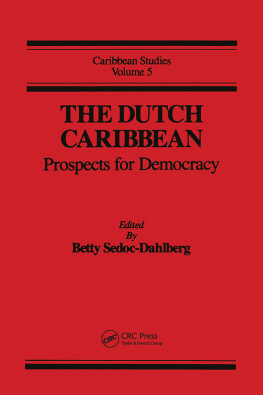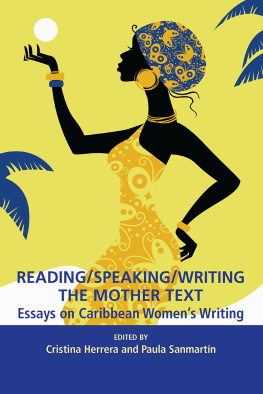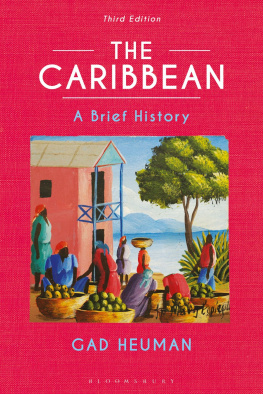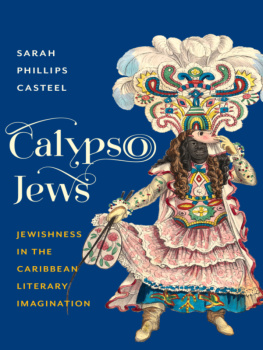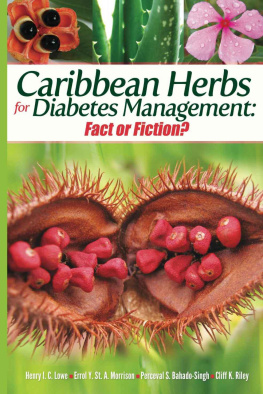The Fiction of Robert Antoni
The Fiction of Robert Antoni
Writing in the Estuary
Richard F. Patteson

University of the West Indies Press
7A Gibraltar Hall Road Mona
Kingston 7 Jamaica
www.uwipress.com
2010 by Richard F. Patteson
All rights reserved. Published 2010
CATALOGUING-IN-PUBLICATION DATA
Patteson, Richard F. (Richard Francis), 1947
The fiction of Robert Antoni: writing in the estuary / Richard F. Patteson
p. cm.
Includes bibliographical references.
ISBN: 978-976-640-275-4
1. Antoni, Robert Criticism and interpretation. I. Title.
PR9272.9.A58 Z78 2010 813.19
Cover illustration: Rafael Martinez, Bodeguera (oil on canvas, 2000). Photographed by Troy DeRego.
Set in Centaur MT 13/16 x 24
Cover and book design by Robert Harris.
Printed in the United States of America.
water is the beginning of all things
Antonio Bentez-Rojo, The Repeating Island
CONTENTS
1
Frontiers of the Word
2
Divina Trace: The Inexhaustible Myth
3
Blessed Is the Fruit: A Feast of Becoming
4
My Grandmothers Erotic Folktales: The Real Treasure of El Dorado
5
Carnival: The Rivers Return
6
Not Yet Finished: A Postscript and a Look Forward
ACKNOWLEDGEMENTS
I am indebted to Robert Antoni for many things, not least for providing me with indispensable information about himself, his family and his ongoing work that would have been otherwise inaccessible. Sincere thanks also to Lynne Rienner, for allowing me to use material from my previous book (Caribbean Passages: A Critical Perspective on New Fiction from the West Indies) as the basis for my discussion of Divina Trace and the early stories.
Students in my Caribbean literature seminar over the years (Amy Myrick, Brad Campbell, Marian Montgomery, to name a few) have influenced my thinking in innumerable ways. I should cite in particular Dean Karpowicz and Eric Smith, who went on to become Antoni scholars in their own right. The input and support of many colleagues, particularly Brad Vice (il miglior fabbro), have also been invaluable.
I began work on this book in late 2000, shortly after purchasing Raphael Martnezs Bodeguera from Bettye Marshall at her gallery in Santo Domingo. From the moment I saw it I associated that face with all the enduring, culture-laden women in Antonis fiction. The paintings reincarnation as book cover is due to the photographic expertise of Troy DeRego and the talent of the design department at the University of the West Indies Press.
I would certainly not want to forget to mention, with much gratitude, Dr Matthew Little, for facilitating a sabbatical near the beginning of this project, and Dr Rich Raymond, for providing me with extra time off and a research assistant toward the end of it. And speaking of that assistant, I should close with a special note of recognition to Nick White, who went through the entire manuscript twice, helping me get it into the correct format for the Press. His fingerprints are on every page.
1
FRONTIERS OF THE WORD
the Caribbean calls for a Cervantes who has read Joyce
Patrick Chamoiseau, Texaco
Occasionally a brief passage, perhaps one composed even before a writer has formed a distinct conception of himself, can reveal much about his subsequent development as an artist. The opening lines of Robert Antonis early story Two-head Fred and Tree-foot Frieda are a case in point:
I loved Zoe because she helped raise me, because she let me pinch her breasts when my mother wasnt around, and because she told me she ate Barbados rat for whooping cough. I loved Jook Jook because he helped raise me, because he let me sip from his rum bottle when my father wasnt around, and because he told me he ate Whatlins Island iguana for grimps.
The symmetry of this sequence of observations forecasts the tendency towards binary structures in Antonis later, much more complex verbal compositions. But we have here as well, in the counterpointed pairs of the verb phrases raised me/let me/old me, a nuanced suggestion of future themes: roots, freedom and the telling of tales. In Divina Trace these elements have assumed the shape of a singular creative vision: Antonis exploration of his Caribbean origins, his forging beyond experiential, cultural and aesthetic frontiers, and the discovery of narratives transformational powers. The colonial and post-colonial worlds of Trinidad, where Antonis parents were born, and the Bahamas, where he grew up, are quietly evoked in the beginning of Two-head Fred by the tacit reference to laws laid down by the mother and father. Thou shalt not pinch breasts. Thou shalt not drink rum. Gently opposing this system of rules and received authority is the liberating influence of Zoe and Jook Jook. The narrator, Addy, loves them because they allow him to grow, removing in their small way some of the restrictions of his childhood, but also because they open up his imagination to a wider world and thereby extend the boundaries of his identity through their storytelling.
Four centuries ago Cervantes tapped into a current of fascination with reality and dream that has run through the novel ever since, like the Guadiana River in Don Quixote, flowing sometimes above the surface and sometimes just below. The fiction of Robert Antoni even such an apprentice piece as Two-head Fred exhibits in a myriad of ways the capacity of imagination to alter fact and charts the highly problematic frontier between the known and the narrated. Addy is a boy given to believing in the reality of the imagined worlds conjured up by Zoe and Jook Jook, while his brother Christopher, his Sancho Panza, constantly pulls him in the direction of phenomenal reality, conventional morality and parental rules. Addy talks about Jook Jooks made-up characters Two-head Fred and Tree-foot Frieda as if they were actual people, while Christopher insists that they do not exist. The brothers are spending part of their vacation at the familys summer place on Deep Water Cay in the Bahamas. Zoe has cared for them and this summer he has set his sights on Zoe.
As the season progresses, a romance develops between Jook Jook and Zoe. At the same time Addy copes with the boredom of island life by imagining ways to make his daily routines more interesting. I had lots of time on my hands, he recalls; ideas were already taking shape in my head. Near the end of his stay on Deep Water Cay he manages to hide himself in a box that Jook Jook uses for a closet. When the lovers come in, Addy knocks over a bottle of rum stowed on the floor but manages to salvage enough of it for several large swallows to calm himself down. What follows is a comic collision of imagination and reality:
The closet began to spin. I closed my eyes. Two-head Fred snapped at me, Why you do dis, boy? Why you do dis to me? I screamed. Zoe screamed. Tief in de house! Tief! I tried to shove out of my closet. It flopped over, trapping me inside, rum spilling, Zoe screaming. Tree-foot Frieda kicked me. How you could do me dis mischief, chil? How you could neglec me so? Commotion filled the house: the sounds of people rushing, crying, yelling.
Two-head Fred might well have been titled A Portrait of the Artist as an Eleven-Year-Old. Its climactic scene enacts the implications of its opening sentences, with Addys adulthood brought closer by his attraction to rum and sex and his already creative consciousness enriched and expanded (though somewhat confusingly) by ideas originating in Zoes and Jook Jooks stories.
Next page
